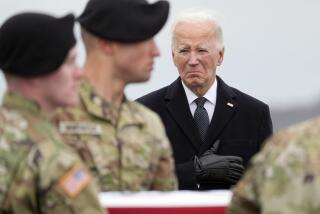Envoys’ Deaths Won’t End Bosnia Efforts, Officials Say
WASHINGTON — The Clinton Administration’s top diplomatic and defense officials, honoring three American peace emissaries who died in the Balkans, pledged Monday to surmount nearly impassable obstacles and finish the job of forging a peace settlement for Bosnia-Herzegovina.
It was too soon, however, to announce the names of new envoys or to take steps to reactivate the peace process that was suspended Saturday after the deaths of the three men in an accident on the treacherous Mt. Igman road as they were traveling to a meeting with Bosnian President Alija Izetbegovic in the capital, Sarajevo.
But Secretary of State Warren Christopher, Defense Secretary William J. Perry and White House National Security Adviser Anthony Lake--intent on making quick decisions to resume diplomatic efforts in Bosnia--met immediately after speaking at ceremonies in tribute to the three men whose bodies arrived at Andrews Air Force Base, Md., in flag-draped caskets.
“We’re moving out very promptly in order not to lose any momentum in this process,” State Department spokesman David Johnson said. “I would discourage you from any suggestion that this process is faltering, because it’s not going to falter.”
Meanwhile, it was announced in Jackson, Wyo., that President Clinton will interrupt his two-week mountain vacation to return here Wednesday to attend a memorial for the three diplomats.
Aides said that Clinton will fly into Washington on Wednesday and speak at the service at 1 p.m. at the chapel at Ft. Myer, Va., adjacent to Arlington National Cemetery.
The three envoys killed when their French armored vehicle slipped down a ravine were Robert Frasure, 53, special envoy for the former Yugoslav federation; Joseph Kruzel, 50, deputy assistant secretary of defense for European affairs, and Air Force Col. Samuel Nelson Drew, 47, a staff member of the National Security Council.
At the ceremonies at Andrews Air Force Base on Monday, Perry and Lake spoke of the tormented mythical figure Sisyphus, condemned to spend eternity rolling a huge stone up a mountain in Hades, only to have it crash down each time it nears the top.
“We have been pushing the rock of peace up the side of the Bosnian mountain for a long time now,” Perry said, “and it has kept rolling back down. But, like Sisyphus, we will not stop trying.”
Lake took the image a step further. “Unlike Sisyphus,” he said, “we will put the rock on top of the mountain.”
Christopher expressed similar thoughts. “One day the shells will stop falling in Bosnia, the minefields will be cleared and the terrible cycle of needless violence and death in Bosnia will finally come to an end,” he said. “When it does, it will be due to devoted peacemakers like Bob and Joe and Nelson and to their colleagues who survived.”
Richard Holbrooke, an assistant secretary of state who was riding in another vehicle when the accident occurred and accompanied the caskets to Andrews, has told reporters he intends to be back in Bosnia early next week. But the replacement of Frasure, a key member of his negotiating team, may be tough.
“The peace plan that our delegation was pursuing this last week,” Christopher said, “drew heavily on Bob’s insight and on his wisdom. He helped shape its elements, and he gave all his energy to fulfilling its promise.”
The plan would divide Bosnia almost equally between the Bosnian Serbs and a confederation of Croats and the Muslim government.
Broder reported from Jackson and Meisler from Washington.
More to Read
Sign up for Essential California
The most important California stories and recommendations in your inbox every morning.
You may occasionally receive promotional content from the Los Angeles Times.










